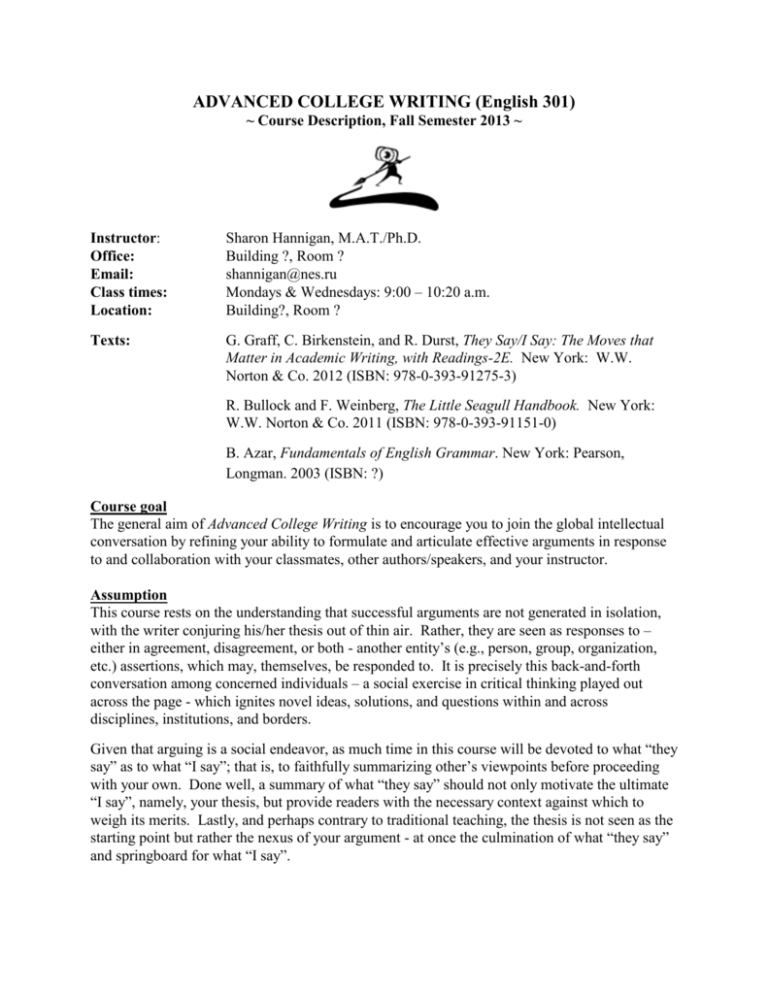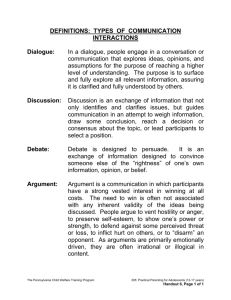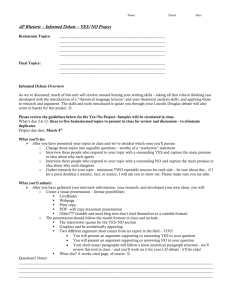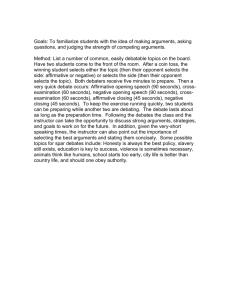
ADVANCED COLLEGE WRITING (English 301)
~ Course Description, Fall Semester 2013 ~
Instructor:
Office:
Email:
Class times:
Location:
Sharon Hannigan, M.A.T./Ph.D.
Building ?, Room ?
shannigan@nes.ru
Mondays & Wednesdays: 9:00 – 10:20 a.m.
Building?, Room ?
Texts:
G. Graff, C. Birkenstein, and R. Durst, They Say/I Say: The Moves that
Matter in Academic Writing, with Readings-2E. New York: W.W.
Norton & Co. 2012 (ISBN: 978-0-393-91275-3)
R. Bullock and F. Weinberg, The Little Seagull Handbook. New York:
W.W. Norton & Co. 2011 (ISBN: 978-0-393-91151-0)
B. Azar, Fundamentals of English Grammar. New York: Pearson,
Longman. 2003 (ISBN: ?)
Course goal
The general aim of Advanced College Writing is to encourage you to join the global intellectual
conversation by refining your ability to formulate and articulate effective arguments in response
to and collaboration with your classmates, other authors/speakers, and your instructor.
Assumption
This course rests on the understanding that successful arguments are not generated in isolation,
with the writer conjuring his/her thesis out of thin air. Rather, they are seen as responses to –
either in agreement, disagreement, or both - another entity’s (e.g., person, group, organization,
etc.) assertions, which may, themselves, be responded to. It is precisely this back-and-forth
conversation among concerned individuals – a social exercise in critical thinking played out
across the page - which ignites novel ideas, solutions, and questions within and across
disciplines, institutions, and borders.
Given that arguing is a social endeavor, as much time in this course will be devoted to what “they
say” as to what “I say”; that is, to faithfully summarizing other’s viewpoints before proceeding
with your own. Done well, a summary of what “they say” should not only motivate the ultimate
“I say”, namely, your thesis, but provide readers with the necessary context against which to
weigh its merits. Lastly, and perhaps contrary to traditional teaching, the thesis is not seen as the
starting point but rather the nexus of your argument - at once the culmination of what “they say”
and springboard for what “I say”.
Learning objectives
By the end of the semester, it is my hope that you…
(1) Recognize advanced college writing as essentially argumentative.
(2) Understand that successful arguments are not generated in a vacuum but are
responses to prevailing issues, viewpoints, or conditions - are inherently social
activities.
(3) Take the overarching template of our course text, namely, “They Say…/I Say…”, to
heart; that is, carefully reflect upon and faithfully summarize what others have already
said (“They Say”) about a particular issue as a means by which to enter an ongoing
intellectual conversation and generate your own response to it (“I Say”).
(4) Engage fully in this course’s think-to-speak-to-write-to-think… cycle, where
reflection and oral argument (debate) will set the stage for written argument.
(5) Hone your critical and independent thinking skills through close reading/viewing of
successful and unsuccessful arguments delivered in a variety of mediums (e.g., essays,
TED talks, NPR segments, blogs, etc.).
(6) Allow debate with and feedback from both peers and the instructor to spark
creative thinking that ultimately finds coherent expression on the page.
(7) View rhetorical modes not as ends in and of themselves but as tools judiciously
selected by the writer to satisfy the demands of his/her argument.
(8) Elevate overall L2 communicative competence via target grammar lessons, vocabulary
builders, logical reasoning templates, discourse pattern analyses, etc.
Course format
This course has been organized into four modules, each exploring a question of current U.S.
public concern introduced and debated across readings in the text, “They Say/I Say”. Each
module spans three weeks, with the focus of the first week on identifying the “rhetorical moves
that matter” through close reading of published works and your own writing. In addition, we will
strive to improve your writing through collaborative “writing clinics”, where, in addition to
putting newly acquired rhetorical moves into practice, you and your classmates will engage in
target grammar, vocabulary, and peer editing exercises based on submitted work.
Aside from continued rhetorical text analyses and writing clinics, a major focus of the second
week of each module will be on preparing oral arguments (debates) in response to the module
question. The debates, scheduled to occur in class the following week, are pivotal in that they
will serve as the major pre-writing exercise for all assigned written arguments.
The third week of each module, dubbed, Module “x” Expression: Oral and Written Argument,
aims to synthesize and actualize the rhetorical analyses, writing clinics, and debate preparation of
the previous two weeks by inviting you to (1) formally debate the module question (oral
argument assessment), and then (2) set your verbalized – and therefore well-processed – thoughts
to paper in an organized and coherent fashion (written argument assessment). More specifically
and true to the “They Say/I Say” pattern outlined in “Assumption”, above, a requirement of every
written argument is that you faithfully summarize what they – in this case the opposing debate
team - say before launching into what I – either your debate team or you, personally – say in
response. My hope is that this balanced progression facilitates the internalization of rhetorical
moves and the development of critical, independent, and creative thinking skills essential to
accurate and profound argument.
Collaborative Writing Project
Another feature of this course is the Collaborative Writing Project (CWP), where you and a
classmate or two will accomplish the English 301 “course goal” (see above) of joining a live
global intellectual conversation. The project, to be carried out in five steps, will culminate in a
coauthored argument in response to an entity’s online claim – one that will ultimately be situated
in an electronic conversation; that is, uploaded to the entity’s internet site (blog, online forum,
virtual seminar, etc.) for critical back-and-forth debate. In addition, during the final week of the
semester you and your partner(s) will co-present your CWP to the rest of the class by (1)
navigating to the electronic site harboring the entity’s claim, your response to that claim, and
threads of both arguments; (2) show and tell how the intellectual conversation you joined
meandered in cyber time and space – visual displays encouraged, here; and (3) try to convince
your classmates of the importance of joining this particular conversation. Why do we need to
think critically and creatively on the issue you’ve chosen to become engaged in?
Evaluation
Writing:
Partial written argument + revision (Module 1: summary & thesis) worth 10% of
your overall grade – details forthcoming
Partial written argument + revision (Module 2: thesis & support) worth 10% of
your overall grade – details forthcoming
Two full written arguments + revisions (Modules 3&4: summary, thesis, &
support) each worth 15% of your overall grade – details forthcoming
Collaborative Writing Project:
Coauthored argument worth 10% of your overall grade- details forthcoming
Co-authored and –delivered presentation worth 10% of your overall grade –
details forthcoming
Continuous Assessment:
Four oral arguments, or debates (1 per module), each worth 5% of your overall
grade – details forthcoming
Miscellaneous assignments (in-class and homework), collectively worth 10% of
your overall grade
Grading
Partial written arguments (+ revisions):
Full written arguments (+ revisions):
Collaborative Writing Project:
Oral arguments (debates):
Miscellaneous assignments:
20% (10% each)
30% (15% each)
20% (10% each)
20% (5% each)
10%
100%
NOTE 1: The grade for each full written argument will consist of the average of its draft and revision.
NOTE 2: If you receive a failing grade for the course, you will have an opportunity to make up the final
grade by redoing the course assignments you failed during the semester. All make-ups will occur during
make up period, and be evaluated by a committee of three or more faculty members.
Meeting deadlines for exams and assignments
It is expected that assignments will be completed in full and submitted to your instructor by the
due dates specified. Late assignments will not be accepted unless there is a legitimate reason, or
a “real” emergency, that prevents you from submitting them at the designated time (official note
required).
Attendance and active participation
You are expected to attend all classes. If for some very good reason (e.g., sickness or
emergency) you are unable to attend a class, please try to notify your instructor either by email or
phone. For unexcused absences, students are responsible for making up missed information and
assignments. While in class you are expected to actively participate. This means showing up to
class in a timely fashion prepared to discuss the work assigned in the previous meeting (e.g.,
having read relevant text pages, completed assigned exercises, prepared debate materials, etc.).
Please remember that the smooth functioning of our class depends to a great extent on the
amount of care and effort you put into each assignment. It also depends on your willingness to
share your understanding of and ask questions about issues related to course content.
Academic dishonesty, cheating & plagiarism
Academic dishonesty, cheating, and plagiarism will not be tolerated. Please refer to the joint
NES/HSE BAE guidelines for policies and procedures.
Open door policy
Your instructor is happy to meet with you at any point during the semester - whether individually
or in groups (e.g., debate teams, writing clinics, etc.). Please come and see me during my office
hours or by appointment if you have questions regarding any aspect of the course. If you are not
clear on an assignment or have a question about something presented in class, by all means feel
free to contact me.
* I am looking forward to a happy and productive semester with all of you!
ADVANCED COLLEGE WRITING (English 301)
~ Weekly Course Syllabus, Fall Semester 2013 ~
Week 1
~ START-UP WEEK ~
Introductions, student background forms, icebreaker
Course description/syllabus: general format, expectations, assignment due dates
Oral/written argument, review of rhetorical modes, mixing the modes
Templates: “They Say…/I Say…” and others; discourse pattern variation across cultures
“What’s Motivating This Writer?”: Reading for the Conversation, Text, pp. 145-155
~ MODULE 1: IS POP CULTURE ACTUALLY GOOD FOR YOU? ~
Week 2
“They Say…” – the need to start with what others are saying!
(1) The Art of Summarizing:
Text, pp. 19-41
(2) Text analysis:
Selected module 1 readings
(3) “I Take Your Point”
Text, pp. 141-144
Week 3
“They Say…”, continued
(1) The Art of Quoting:
(2) Debate set-up:
(3) CWP STEP 1:
Week 4
Text, pp. 42-51
Debate format, teams, and preparation
“Discover the conversation”
Module 1 Expression: Oral and Written Argument
(1) Module 1 debate:
In class, graded according to rubric
(2) Writing preparation:
Begun in class, continued out of class
-Summarize what “they (opposing debate team) said”
*Written summary due at the start of next meeting!
~ MODULE 2: IS FAST FOOD THE NEW TOBACCO? ~
Week 5
“I Say…”- my own response, motivated by what they said!
(1) Ways to Respond:
Text, pp. 55-77
(2) Text analysis:
Selected module 2 readings
(3) Writing clinic:
Target grammar, vocab., peer edit.
Week 6
“I Say…”, continued
(1) Naysayer/Why it Matters: Text, pp. 78-101
(2) Debate set-up:
Teams and preparation
(3) CWP STEP 2:
“Entertain the conversation”
Week 7
Module 2 Expression: Oral and Written Argument
(1) Module 2 debate:
In class, graded according to rubric
(2) Writing preparation:
Begun in class, continued out of class
-Generate what “I (my team or me, personally) say” - my thesis
-Support what “I say” with examples, reasoning & evidence
*Written thesis & support due at the start of next meeting!
~ MODULE 3: WHY DOES IT MATTER WHO WINS THE BIG GAME? ~
Week 8:10/21,23
Tying It All Together
(1) Connecting/Your Voice:
(2) Text analysis:
(3) Writing clinic:
Text, pp. 105-128
Selected module 3 readings
Target grammar, vocab., peer editing
Week 9:10/28-30
No classes: Consulting Week
Week 10:11/6
Tying It All Together, continued
(1) Art of Metacommentary: Text, pp. 129-138
(2) Debate set-up:
Teams and preparation
(3) CWP STEP 3:
“Respond to the conversation”
Week 11:11/11,13
Module 3 Expression: Oral and Written Argument
(1) Module 3 debate:
In class, graded according to rubric
(2) Writing preparation:
Begun in class, continued out of class
-Summarize what “they (opposing debate team) said”
-Generate what “I (my team or me, personally) say” - my thesis
-Support what “I say” with examples, reasoning, evidence
*Wr. summary, thesis, support due at the start of next meeting!
~ MODULE 4: WHAT’S UP WITH THE AMERICAN DREAM? ~
Week 12:11/18,20
Entering the Conversation
(1) “Analyze This”:
(2) Text analysis:
(3) Writing clinic:
Text, pp. 156-163
Selected module 3 readings
Target grammar, vocab., peer edit.
Week 13:11/25,27
Entering the Conversation, continued
(1) “Analyze This”, cont.:
Text, pp. 164-173
(2) Debate set-up:
Teams and preparation
(3) CWP STEP 4:
“Enter the conversation”
Week 14:12/2,4
Module 4 Expression: Oral and Written Argument
(1) Module 3 debate:
In class, graded according to rubric
(2) Writing preparation:
Begun in class, continued out of class
-Summarize what “they (opposing debate team) said”
-Generate what “I (my team or me, personally) say” - my thesis
-Support what “I say” with examples, reasoning, evidence
*Wr. summary, thesis, support due 1st meeting of following week!
Week 15:12/9,11
WRITING WORKSHOP:
(1) Systematic peer editing of Module 4 written arguments
(2) Target grammar exercises based on Module 4 written arguments
Week 16:12/16,18
CWP STEP 5:
Week 17:12/23-28
HSE Exam Week
“Share the conversation” (co-presentations)
*NOTE: The instructor reserves the right to change the syllabus when deemed necessary.






